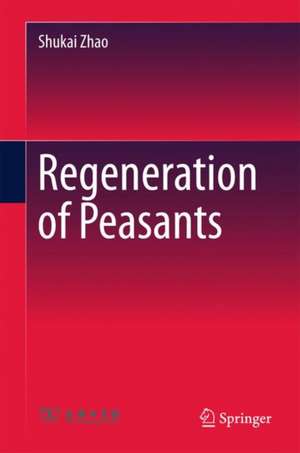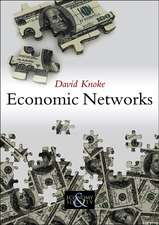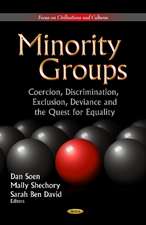Regeneration of Peasants
Autor Shukai Zhaoen Limba Engleză Hardback – 28 feb 2017
| Toate formatele și edițiile | Preț | Express |
|---|---|---|
| Paperback (1) | 637.13 lei 43-57 zile | |
| Springer Nature Singapore – 14 iul 2018 | 637.13 lei 43-57 zile | |
| Hardback (1) | 643.34 lei 43-57 zile | |
| Springer Nature Singapore – 28 feb 2017 | 643.34 lei 43-57 zile |
Preț: 643.34 lei
Preț vechi: 756.86 lei
-15% Nou
Puncte Express: 965
Preț estimativ în valută:
123.13€ • 126.90$ • 103.96£
123.13€ • 126.90$ • 103.96£
Carte tipărită la comandă
Livrare economică 03-17 martie
Preluare comenzi: 021 569.72.76
Specificații
ISBN-13: 9789811033124
ISBN-10: 9811033129
Pagini: 211
Ilustrații: XV, 211 p. 2 illus.
Dimensiuni: 155 x 235 x 14 mm
Greutate: 0.5 kg
Ediția:1st ed. 2017
Editura: Springer Nature Singapore
Colecția Springer
Locul publicării:Singapore, Singapore
ISBN-10: 9811033129
Pagini: 211
Ilustrații: XV, 211 p. 2 illus.
Dimensiuni: 155 x 235 x 14 mm
Greutate: 0.5 kg
Ediția:1st ed. 2017
Editura: Springer Nature Singapore
Colecția Springer
Locul publicării:Singapore, Singapore
Cuprins
Preface.- Chapter 1: Peasants and the Central Government.- Chapter 2: Peasants and the Local Government.- Chapter 3: Peasants and Rural Democratization.- Chapter 4: Peasants and Social Construction.- Chapter 5: Peasants and Local Government Officials.
Notă biografică
Zhao Shukai, born in November 1959 in Laixi of Shangdong Province, is a law PhD, a researcher and an expert who enjoys special government allowance from the State Council. He worked in the Rural Policy Research Office of the Secretariat of the CPC Central Committee from August 1982 to July 1990 and has been working in the Development Research Center of the State Council since August 1990, during which he worked at local level for two years (the Party Committee of Zhuolu County and Zhang Jiakou Municipal Government) and studied abroad for three years (Australian National University, Duke University and Harvard University of America); he used to be China’s Rural Development Project Consultant for UNDP, World Bank and UK Department for International Development). In November 2006, he served as the chief lecturer for the 36th Collective Study of the CPC Central Committee Political Bureau. His main works include Township Governance and Government Institutionalization (The Commercial Press, 2010), Peasant Politics (The Commercial Press, 2011), New Destiny of Peasants (The Commercial Press, 2012), etc.
Textul de pe ultima copertă
This book focuses on analyzing the inter-relationship between Chinese peasants and the reform and it tries to understand the conditions of peasants during the course of the Chinese social transition. This book argues that Chinese peasants are the most important force that keeps the reform going. More importantly, this book argues that this force comes from the peasants’ pursuit of their own social, political and economic interest, not some spontaneous demand for “reform” itself. This inherent relationship between the peasants and the reform is summarized into five major relationships: the inter-relationship between peasants and the central government; between peasants and local government; between peasants and rural democratization; between peasants and social constructions; and between peasants and local officials. These five inter-relationships are the prime mechanism for the interaction between Chinese peasants and the reform, and these forms the basis for understanding and analyzing the inter-relationship between the state and peasants.
Caracteristici
Analyzes the behavior of Chinese peasants in practice Challenges theoretical stereotypes about Chinese peasants Clears up theoretical basis for rural policy making Includes supplementary material: sn.pub/extras














